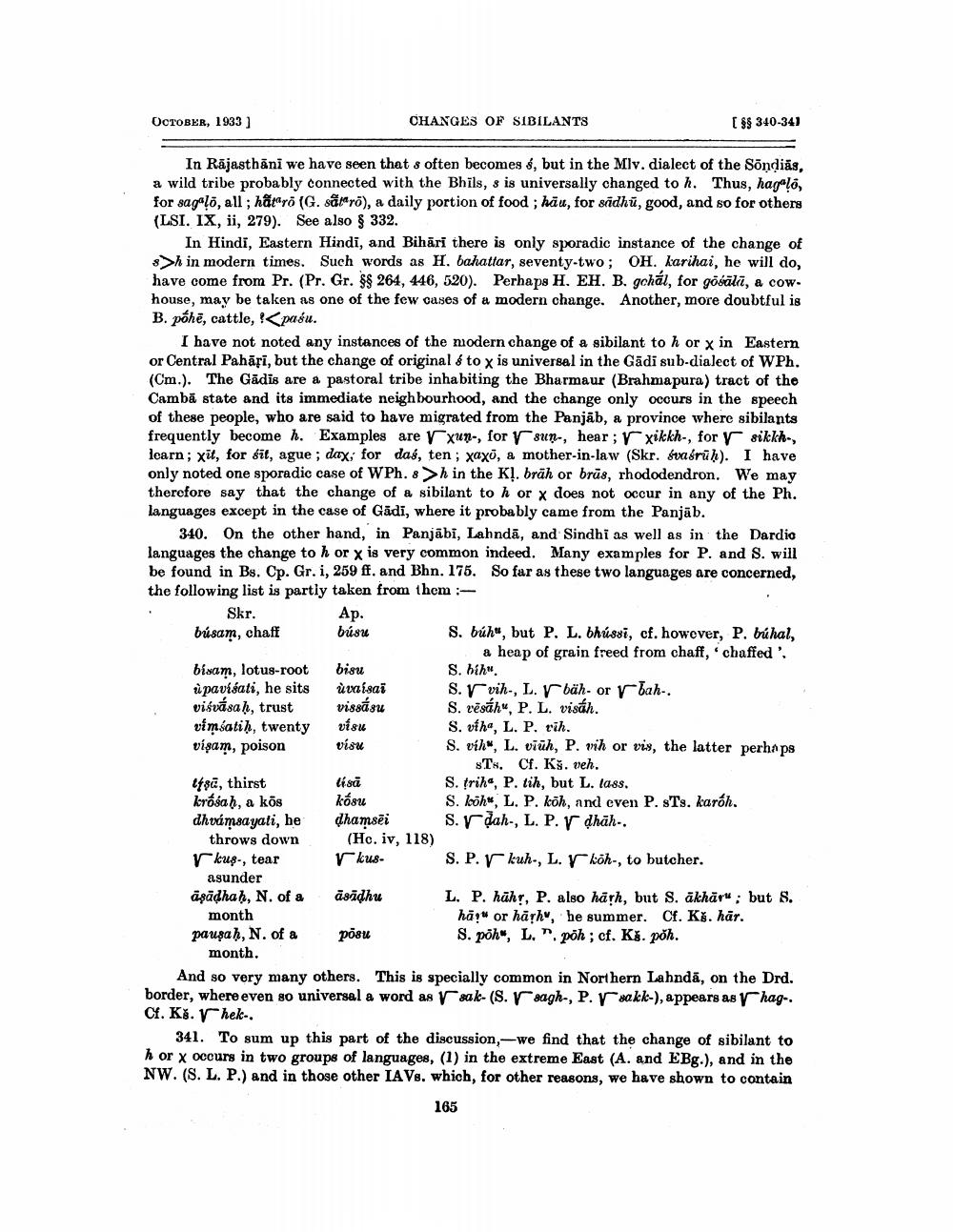________________
OCTOBER, 1933]
CHANGES OF SIBILANTS
[88 340-341
In Rājasthāni we have seen that s often becomes 6, but in the Mlv. dialect of the Sõndiäs, a wild tribe probably connected with the Bhils, s is universally changed to h. Thus, hagelo, for saglö, all; hataró (G. samrő), a daily portion of food ; häu, for sadhū, good, and so for others (LSI. IX, ii, 279). See also $ 332.
In Hindi. Eastern Hindi, and Bihāri there is only sporadic instance of the change of $>h in modern times. Such words as H. bahattar, seventy-two; OH, karihai, he will do, have come from Pr. (Pr. Gr. $S 264, 446, 520). Perhaps H. EH. B. gchál, for gośāli, a cow. house, may be taken as one of the few cases of a modern change. Another, more doubtful is B. põhē, cattle, !<pašu.
I have not noted any instances of the modern change of a sibilant to h or x in Eastern or Central Pahāri, but the change of original & to x is universal in the Gādi sub-dialect of WPh. (Cm.). The Gādīs are a pastoral tribe inhabiting the Bharmaur (Brahmapura) tract of the Cambă state and its immediate neighbourhood, and the change only occurs in the speech of these people, who are said to have migrated from the Panjab, a province where sibilants frequently become h. Examples are rxun, for r sun-, hear; r xikkh-, for v sikkh-, learn; xit, for sit, ague ; dax; for daí, ten ; xaxo, a mother-in-law (Skr. Sva srüh). I have only noted one sporadic case of W Ph.>h in the Kļ. brāh or brūs, rhododendron. We may therefore say that the change of a sibilant to h or x does not occur in any of the Ph. languages except in the case of Gādi, where it probably came from the Panjāb.
340. On the other hand, in Panjābi, Lahndā, and Sindhi as well as in the Dardio languages the change to h or x is very common indeed. Many examples for P. and S. will be found in Bs. Cp. Gr. i, 259 ff. and Bhn. 175. So far as these two languages are concerned, the following list is partiy taken from them :Skr.
Ap. búsam, chafi búsu
8. búh", but P. L. bhússi, cf. however, P. brúhal,
a heap of grain freed from chaff,chaffed'. bisam, lotus-root bisu
S. bih u pavisati, he sits uvaisai S. vih, L. r bäh- or r bah-. visvásah, trust vissásu S. rēsáh", P. L. visáh. vimšatih, twenty vísu
S. viha, L. P. rih. visam, poison vísu
S. vih, L. viuh, P. vih or vis, the latter perhaps
STs. Cf. Kš. veh. Ifsa, thirst
lisa
S. trih, P. tih, but L. lass. króśah, a kos kósu
S. köh", L. P. kõh, and even P. sTs, karóh. dhrámsayali, he dhamsēi S. r dah-, L. P. r dhāh..
throws down (Hc. iv, 118) r kus-, tear vkus
S.P. r kuh-, L. r kõh-, to butcher. asunder aşādhah, N. of a ăsidhu
L. P. hähr, P. also harh, but S. ākhāru : but S. month
hāror hārhu, be summer. Cf. Kš. här. pausah, N. of a posu
S. põh", L. põh; cf. Ks. põh. month. And so very many others. This is specially common in Northern Lahndā, on the Drd. border, where even go universal a word as v sal-(s. reagh-, P. Vsakk-), appears as rhag-. Cf. Kš. r hek.
341. To sum up this part of the discussion,- we find that the change of sibilant to h or x occurs in two groups of languages, (1) in the extreme East (A. and EBg.), and in the NW. (S. L. P.) and in those other IAVs, which, for other reasons, we have shown to contain
165




